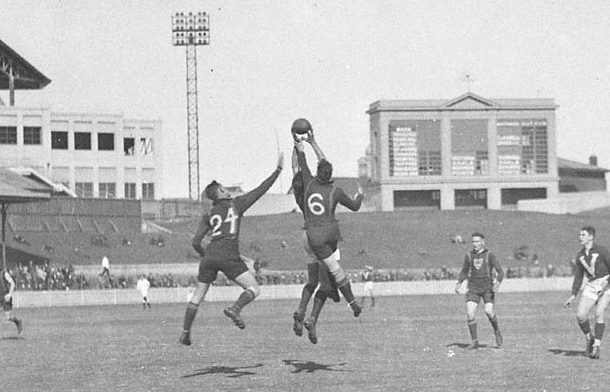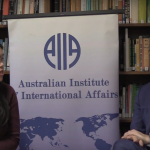A sporting chance for liberty

John Passmore’s The Limits of Government refers to the tale of King Canute who is often wrongly accused of claiming to be able to turn the tide with a wave of his hand. It’s more likely Canute was trying to show his subjects that their expectations were beyond his powers.
While travelling and on TV we often see things that would be unlawful in Australia. It’s said that Australians are the only people who will wait for the pedestrian ‘green man’ to appear at 3 am in pouring rain with no traffic for miles around.
We seem to be a pretty compliant lot but whenever something happens that offends our idea of a fair go we say “there should be a law against that”. Some even seem to think that humans can be perfected by regulation. Paradoxically, however, grumbling about being over-governed is a national pastime, almost a sport.
If I’m about to enter a carpark or a roundabout or have no choice but to drive across a continuous white line, I have to negotiate a maze of rules and a confounding array of potential scenarios. The best policy is if you’re going to crash, don’t do it in a carpark or roundabout.
Taxation law has become a war of attrition between lawmakers and accountants. It has been estimated that if tax law keeps growing at the rate of the last few years, there’ll be billions of pages by the end of the century. In 2006, 4100 pages were taken out of the tax legislation to ‘improve readability’. In civil life, the sense of being ‘governed’ is much stronger than the feeling of participation.
The rules of Australian football are a close analogue for our jurisprudence. AFL players running flat out have to instantly decide if they are in the right place and under the prescribed amount of ‘pressure’ to concede a minor score, thus preventing the opposition scoring a goal and also to gain possession of the ball for their team.
Failing to ‘designate’ properly before a ruck contest attracts a penalty. Umpires have to read the minds of players as to where they intended to kick a randomly bouncing ball or whether they have made a ‘genuine’ attempt to do this or that.
A technical infringement can attract the same fifty-metre penalty as a serious, reportable offence. The punishment should fit the crime. A one-size-fits-all penalty distorts the contest: get rid of it. A doubtful ‘advantage’ call can dramatically change the momentum of a game and destroy the vital interplay between players and spectators.
‘Applaud’ and ‘Cheer’ prompts on the big screen won’t do. It is only a matter of time before a major game or even a premiership is decided by a bureaucratic decision and not by the players.
Instead of constantly meddling with the rules, why not at least experiment with simplifying them. It’s an ‘invasion’ sport incorporating a glorified version of ‘keepings-off’. As it is, many great players of the past would not get a game now because they weren’t 2 metres tall, but they used their strength and skill to advantage and it was good to watch.
Forget about dictating where players should stand, except it would be worth testing a rule that at all times, at least 3 players must be in their defensive half. A defender running forward could be replaced in the defensive half by another player running back before the ball is kicked or handballed. It would take only a little concentration as they do in other codes to avoid being ‘off-side’.
Marks taken on the defensive side of centre from kicks ‘backwards’ would not be awarded. Taking ‘liberties’ with the ball and tactical time-wasting close to the end of a match would be discouraged. And try replacing all boundary throw-ins with kicking in as they do for out-on-the-full and as in soccer. There would be no need to guess if the player meant to kick the ball out of bounds, but doing so would give an advantage to the opposing side.
No score could result directly from a boundary kick-in. Boundary umpires would still be needed to decide which team ‘won’ the kick-in. Were three players behind centre when the ball was kicked; was a mark taken behind or forward of centre etc.
The imposition of increasingly complex and clumsy regulation in sport or public administration can stifle creativity and obstruct the energetic pursuit of excellence.
A reasonable measure of regulation is necessary and a good thing, but umpires and lawmakers cannot be players as well; they must not play with liberty as a political football.
We have to define the limits of government before it crosses the fragile boundaries that separate its parts; and we should mark where liberty boots authoritarianism out of bounds.
Image – Players contest a mark at the 1933 Australian Rules Football National Carnival at the Sydney Cricket Ground in a match between Victoria and Tasmania.

Max Thomas, Dip. Agric. (retired) worked in the public sector and in private consulting on a range of land, water and waste management projects. He prepared guidelines for irrigation with recycled water for EPA Victoria and developed a number of Environmental Management Systems in the water industry.












